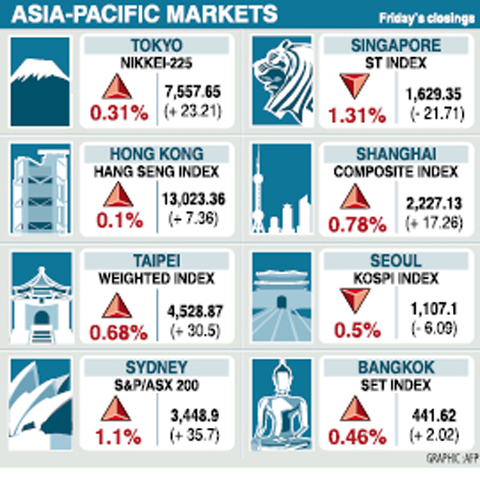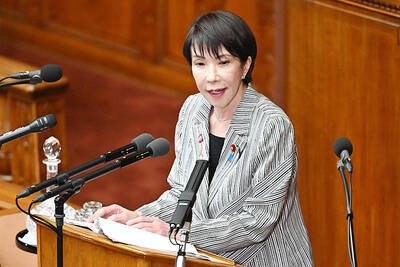US stocks ended a turbulent week by plunging to six-year lows amid concerns over ailing financial institutions and their prospective nationalization.
The Dow Jones Industrial Average fell a hefty 6.17 percent over the week to its lowest level since October 2002 at 7,365.67 on Friday, dogged by concerns that key banks such as Bank of America and Citigroup will be taken over by the government. The tech-rich NASDAQ composite fell 6.07 percent over the week to 1,441.23 and the broad-market Standard & Poor’s 500 tumbled 6.87 percent to 770.05.
The market continued to falter even after US President Barack Obama signed a bill for a nearly US$800 billion economic stimulus package and unveiled a multibillion dollar plan to contain a home mortgage crisis at the epicenter of global financial turmoil.

Investors zeroed in on the financial stocks amid concerns over bad assets troubling banks and rumors over their nationalization which the Obama administration moved to dispel.
“Financial stocks continue to represent the biggest concern for the broader market, and will continue to do so in the coming week,” Briefing.com said.
Uncertainty remain “regarding the depth and duration of the global recession and exacerbated fears that more pain and restructuring may lie ahead for the financial sector,” analysts at Charles Schwab & Co said in a report.
“It may take quite a bit more policy force to break the back of the recession” that has gripped the US for the past year, economists at IHS Global Insight wrote.
The US government is scheduled to release in the coming week a preliminary GDP projection for the fourth quarter of last year — the second update on economic activity for the quarter. Most economists surveyed expect that GDP in the quarter fell 5.4 percent, subsequent to receiving revisions to data after the first reading of negative 3.8 percent.
The GDP decline “is expected to be more severe than previously reported,” IHS Global Insight said.
Other fresh data to be released next week “will not do much to allay” concerns over the economy, it said. Among others, consumer confidence measures for this month as a whole are expected to sink and total new and existing home sales are expected to have declined last month, the market analysis firm said.

‘SECRETS’: While saying China would not attack during his presidency, Donald Trump declined to say how Washington would respond if Beijing were to take military action US President Donald Trump said that China would not take military action against Taiwan while he is president, as the Chinese leaders “know the consequences.” Trump made the statement during an interview on CBS’ 60 Minutes program that aired on Sunday, a few days after his meeting with Chinese President Xi Jinping (習近平) in South Korea. “He [Xi] has openly said, and his people have openly said at meetings, ‘we would never do anything while President Trump is president,’ because they know the consequences,” Trump said in the interview. However, he repeatedly declined to say exactly how Washington would respond in

Japanese Prime Minister Sanae Takaichi said yesterday that China using armed force against Taiwan could constitute a "survival-threatening situation" for Japan, allowing the country to mobilize the Japanese armed forces under its security laws. Takaichi made the remarks during a parliamentary session yesterday while responding to a question about whether a "Taiwan contingency" involving a Chinese naval blockade would qualify as a "survival-threatening situation" for Japan, according to a report by Japan’s Asahi Shimbun. "If warships are used and other armed actions are involved, I believe this could constitute a survival- threatening

WARFARE: All sectors of society should recognize, unite, and collectively resist and condemn Beijing’s cross-border suppression, MAC Minister Chiu Chui-cheng said The number of Taiwanese detained because of legal affairs by Chinese authorities has tripled this year, as Beijing intensified its intimidation and division of Taiwanese by combining lawfare and cognitive warfare, the Mainland Affairs Council (MAC) said yesterday. MAC Minister Chiu Chui-cheng (邱垂正) made the statement in response to questions by Democratic Progressive Party (DPP) Legislator Puma Shen (沈柏洋) about the government’s response to counter Chinese public opinion warfare, lawfare and psychological warfare. Shen said he is also being investigated by China for promoting “Taiwanese independence.” He was referring to a report published on Tuesday last week by China’s state-run Xinhua news agency,

‘ADDITIONAL CONDITION’: Taiwan will work with like-minded countries to protect its right to participate in next year’s meeting, the foreign ministry said The US will “continue to press China for security arrangements and protocols that safeguard all participants when attending APEC meetings in China,” a US Department of State spokesperson said yesterday, after Beijing suggested that members must adhere to its “one China principle” to participate. “The United States insists on the full and equal participation of all APEC member economies — including Taiwan — consistent with APEC’s guidelines, rules and established practice, as affirmed by China in its offer to host in 2026,” the unnamed spokesperson said in response to media queries about China putting a “one China” principle condition on Taiwan’s